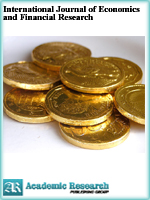International Journal of Economics and Financial Research
Online ISSN: 2411-9407
Print ISSN: 2413-8533
Print ISSN: 2413-8533
Quarterly Published (4 Issues Per Year)

Archives
Volume 8 Number 2 June 2022
Tax Optimality in Turkey: An Analysis for Total Tax Revenues
Authors: Filiz GİRAY ; Gamze ÇİMEN
Pages: 63-77
DOI: doi.org/10.32861/ijefr.82.63.77
Abstract
Within the scope of optimal tax theory, the optimality problem of fiscal policies in the Turkish tax system for the period 1980-2019 will be discussed from the perspective of the Laffer curve. The study, it is aimed to obtain the real Laffer curve showing the relationship between total tax revenues and tax rate for Turkey. Macroeconomic variables such as tax rates, tax revenues, crisis periods, unemployment rates, and real wages are included in the analysis with the help of an econometric package program. Within the scope of time series, the effect of the tax rate on tax revenues was investigated using Johansen and ARDL cointegration approaches. According to the findings obtained from the analyses, the total tax rates in Turkey are on the right of the Laffer curve, in other words, the Laffer curve exceeds the optimal point. Based on the hypothetical existence of Laffer theorem’s in Turkey, the optimal tax rates were calculated for the total tax revenues, and the current tax rates of each year were compared with the optimal tax rates. It has been determined that the total tax rates in the specified period are in the forbidden region of the Laffer curve. This situation, which states that the tax burden has increased, reveals that the taxation process should be revised. There is no comprehensive empirical analysis of Turkey. The findings will guide the applications that will contribute to the field. The originality of the work; is based on the inclusion of time series analysis of macroeconomic data such as crisis periods, unemployment rates, real wages as independent variables in determining the relationship between tax revenues and tax rates. The validity of the Laffer curve for each tax (Income Tax, Corporation Tax, VAT) in the Turkish tax system can be examined with the data and methods used in the research.
Is There Competition in Budget Policy of Education and Defense in Indonesia?
Authors: Posma Sariguna Johnson Kennedy
Pages: 58-62
DOI: doi.org/10.32861/ijefr.82.58.62
Abstract
This study aims to see whether competition occurs in determines defense budget policies and education budgets. This study uses a quantitative research method by the empirical mathematical model to see the effect of the defense budget policy on the education budget in Indonesia. From the regression results, it turns out that Indonesia’s budget policies for defense and education have not reduced each other. This situation cannot be responded to well because the two budgets are still minimal compared to all national income and the entire budget. It is recommended that the defense and education budgets be increased because they relate to social welfare.
The Impact of Covid-19 on the Financial Performance of Banking Sector Operating in GCC Countries
Authors: Mohammed Makni
Pages: 50-57
DOI: doi.org/10.32861/ijefr.82.50.57
Abstract
The Covid-19 pandemic has had a significant impact on the industries around the world, since the banking sector is one of the most important contributors to an economy, it has been selected for this research. The literature has limited studies associated with the performance of banks in the GCC countries during the pandemic using secondary quantitative data. The Gulf region which includes Bahrain, Kuwait, Oman, Qatar, Saudi Arabia, and the United Arab Emirates has been specified in the research to identify how the pandemic has affected the banking sector. The research was conducted on secondary quantitative data of 20 banks which has been analyzed using descriptive statistics and graphical analysis to look at the changes in profitability of the banks. The results indicate that the overall performance of banks has been affected as evidenced by lower ratios in terms of profitability, credibility, and financial leverage. Although, the ratios became steadily decreased just after the pandemic started. The topic has been covered for western countries or Islamic banks only using different methodologies, however, for GCC countries and secondary quantitative data of both Islamic and conventional banks, the studies are limited.
Full Modified Ordinary Least Square Analysis of the Relationship between New Technologies of Information, Financial Development and Growth in WAEMU Zone
Authors: DRAMA Bédi Guy Hervé
Pages: 39-49
DOI: doi.org/10.32861/ijefr.82.39.49
Abstract
This paper aims to study the relationship between financial development, information, and communication technology (ICTs) diffusion and economic growth by examining the effects of interactions between finance and ICT on economic growth. The study covers eight West African Economic and Monetary Union (WAEMU) countries and spans the period from 2000 to 2018. The empirical results, after applying the fully modified ordinary least squares (FMOLS) estimator can be generalized as follows. First, regardless of the financial development indicator used, the empirical results show that financial development negatively influences economic growth in the WAEMU. This counter-intuitive relationship may be related to many phenomena, but there are no clear explanations in the literature yet. Second, ICTs diffusion improves economic growth in the zone. This implies that WAEMU countries should strengthen their ICTs policies and improve the use of new information and communication technologies. Finally, the interaction between ICTs diffusion and financial development is positive and significant in explaining growth. This implies that the economies of the WAEMU region can only benefit from financial development once a level of ICTs development is reached.



